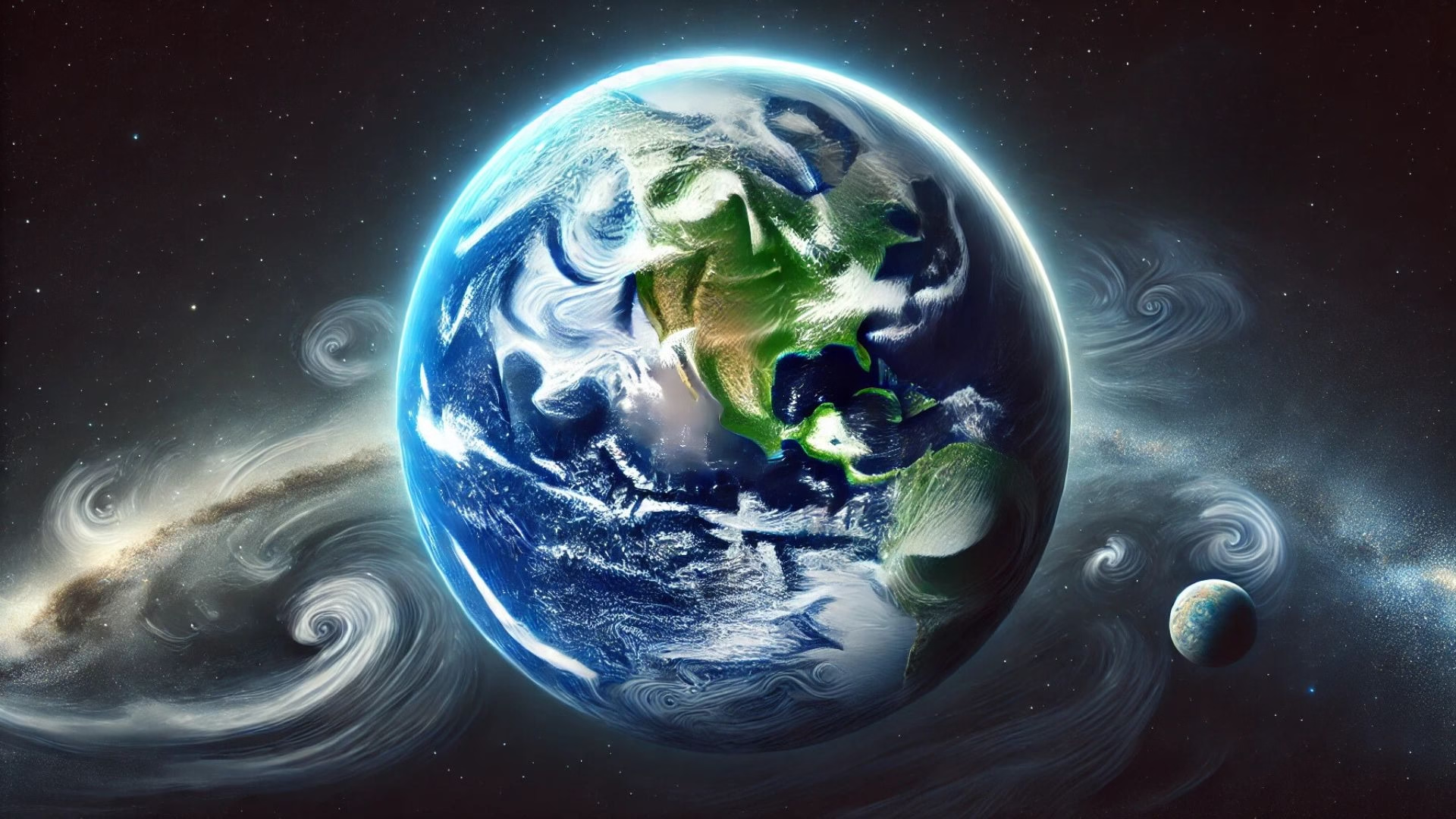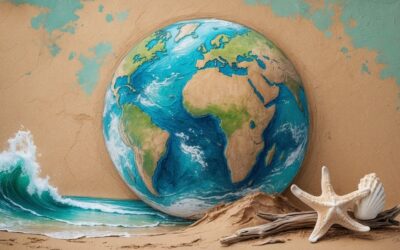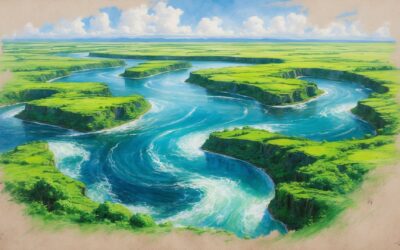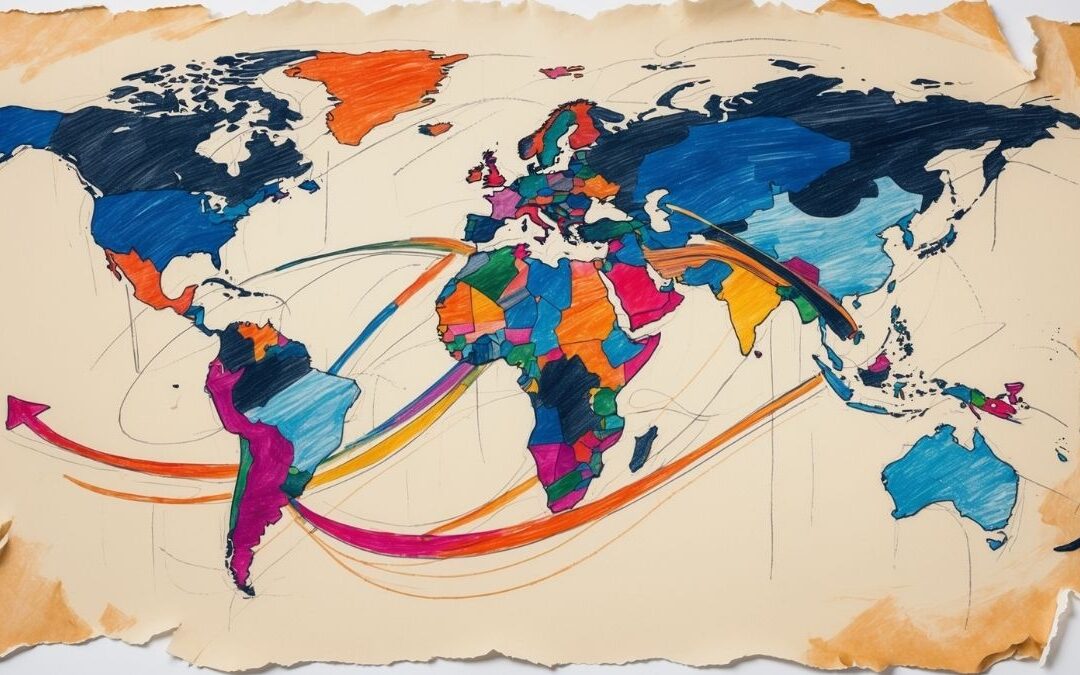- Podcast Episode
- Why is Earth Called the Blue Planet?
- The Role of Earth’s Oceans
- The Atmosphere: Earth’s Protective Shield
- Earth’s Unique Biosphere
- The Geological Wonders of Earth
- Earth’s Place in the Cosmos
- Challenges Facing the Blue Planet
- Why Earth Matters
- Let’s Talk
- Let’s Learn Vocabulary in Context
- Let’s Discuss & Write
- Let’s Play
Podcast Episode
Earth, our home, is a truly remarkable planet. Among the countless celestial bodies in the universe, Earth stands out as a haven for life. Known as the Blue Planet, its vivid blue appearance from space is due to its vast oceans that cover more than 70% of its surface. But Earth’s story goes far beyond its oceans. It’s a tale of dynamic ecosystems, life-sustaining atmospheres, and a delicate balance that allows life to thrive.
Why is Earth Called the Blue Planet?
The nickname “Blue Planet” comes from Earth’s appearance when viewed from space. Its oceans reflect sunlight, giving it a brilliant blue hue. With water covering most of its surface, Earth is unique in the solar system. No other known planet boasts such vast, liquid water reservoirs, making it the essential ingredient for life as we know it.
The Role of Earth’s Oceans
Earth’s oceans are more than just scenic views or habitats for marine life—they are the planet’s life-support system. They regulate temperatures, drive weather patterns, and store carbon, playing a key role in the global climate system.
The oceans are also home to some of Earth’s most fascinating mysteries. Did you know that more than 80% of the ocean floor remains unexplored? It’s like having an alien world right here on our planet. From the colorful coral reefs to the mysterious deep-sea vents, the oceans are a treasure trove of biodiversity and wonder.
The Atmosphere: Earth’s Protective Shield
Earth’s atmosphere is another standout feature. Composed of nitrogen, oxygen, and trace amounts of other gases, it creates a breathable environment for life. The atmosphere acts as a protective shield, blocking harmful solar radiation and moderating the planet’s temperature.
This delicate layer also plays a starring role in weather and climate. From rainstorms that replenish freshwater supplies to winds that distribute heat, the atmosphere works behind the scenes to keep Earth habitable.
Earth’s Unique Biosphere
What truly sets Earth apart is its biosphere—the thin layer of life that exists in harmony with its land, air, and water. This biosphere supports millions of species, from microscopic bacteria to towering redwoods.
Life on Earth is interconnected. Plants produce oxygen that animals breathe. Oceans regulate temperatures, which impact land ecosystems. Even tiny microorganisms in the soil contribute to the planet’s health by cycling nutrients. This intricate web of life is fragile yet incredibly resilient, adapting over millions of years to changing conditions.
The Geological Wonders of Earth
Beneath its lush surface, Earth has a dynamic core that shapes its geological features. Tectonic plates create mountains, earthquakes, and volcanoes, constantly reshaping the planet. These processes, while destructive at times, have also contributed to Earth’s beauty and biodiversity.
For example, the Himalayas—the tallest mountain range in the world—formed millions of years ago due to the collision of tectonic plates. Similarly, volcanic eruptions have created fertile lands, supporting agriculture and human civilizations for centuries.
Earth’s Place in the Cosmos
In the grand scheme of the universe, Earth is a small, rocky planet orbiting an average star. Yet, it’s the only known planet to harbor life. Scientists often describe Earth as existing in the “Goldilocks zone,” where conditions are “just right” for liquid water and a stable climate.
But Earth’s journey through space isn’t without challenges. Asteroid impacts, solar flares, and human-induced climate changes remind us of the planet’s vulnerabilities. Still, Earth has demonstrated remarkable resilience over billions of years, evolving and adapting to survive.
Challenges Facing the Blue Planet
While Earth has proven its resilience, human activity has placed unprecedented strain on its ecosystems. Pollution, deforestation, and climate change are altering the planet’s natural balance. Rising sea levels, shrinking ice caps, and loss of biodiversity are just a few of the challenges threatening Earth’s future.
However, there’s hope. Conservation efforts, renewable energy, and sustainable practices offer solutions to mitigate the damage. By understanding Earth’s intricate systems and taking action, we can preserve this incredible planet for future generations.
Why Earth Matters
Earth is more than just a planet; it’s a living, breathing ecosystem that supports everything we know and cherish. Its beauty, diversity, and life-sustaining systems make it unparalleled in the cosmos. By appreciating Earth’s wonders and recognizing its challenges, we can work together to protect our shared home.
Earth’s story is one of beauty, resilience, and interconnectedness. From its oceans to its atmosphere, from its geological marvels to its thriving biosphere, Earth is a testament to the delicate balance required to sustain life. As we continue to explore beyond our planet, Earth remains a reminder of how rare and precious life truly is.
Let’s cherish and protect the Blue Planet—it’s the only home we have.
Let’s Talk
Earth being called the Blue Planet might seem like a simple fact, but doesn’t it feel like there’s so much more to explore? Think about it—this little planet of ours is a cosmic jackpot of life and beauty, yet we often take it for granted. Take the oceans, for instance. Sure, they make Earth blue and pretty from space, but did you know they hold secrets we haven’t even begun to uncover? More than 80% of the ocean floor is unexplored! It’s like having the ultimate treasure chest in our backyard but never lifting the lid. And it’s not just about the cool creatures hiding in the depths—those oceans also keep our planet running smoothly, regulating climate and producing much of the oxygen we breathe.
And then there’s the atmosphere. Have you ever thought about how lucky we are to have this invisible shield protecting us? It blocks out harmful radiation and keeps the planet warm enough for life. Imagine Earth without it—no sunsets, no breathable air, no weather to complain about! Yet, we’re constantly pushing this fragile system to its limits with pollution and greenhouse gases.
What really strikes me is Earth’s adaptability. Over billions of years, it has faced massive asteroid impacts, ice ages, and even cataclysmic volcanic eruptions, yet it’s still here, teeming with life. But here’s the catch: adaptability isn’t the same as invincibility. We’ve reached a point where the changes we’re causing—deforestation, rising CO2 levels, shrinking ice caps—are happening too quickly for many ecosystems to adjust. It makes you wonder, are we pushing Earth past its breaking point?
Let’s shift the focus for a second. What about the geological wonders of Earth? From majestic mountains to active volcanoes, these features don’t just look cool; they tell the story of Earth’s restless energy beneath the surface. But here’s something to chew on: these same forces that create beauty can also cause destruction. Earthquakes and tsunamis are stark reminders of the planet’s power. So, how do we live harmoniously with a planet that’s both our home and a bit of a wildcard?
Finally, there’s the big picture—Earth’s place in the universe. We often call it the “Goldilocks planet,” perfectly positioned for life. But think about how precarious that balance is. A little closer to the Sun, and we’d be a scorched wasteland. A little farther, and we’d be a frozen rock. That perspective makes every sunrise, every forest, every drop of water feel like a miracle. So here’s a question: if Earth is this unique, why don’t we treat it like the rare gem it is?
Let’s Learn Vocabulary in Context
Talking about Earth as the Blue Planet introduces some incredible words that are not only scientific but also useful in everyday language. For example, let’s start with atmosphere. It’s the protective bubble of gases that makes life possible on Earth, but in daily conversations, it’s also used to describe the vibe of a place. Ever been to a café with a cozy atmosphere? Same word, different context.
Now think about biodiversity, which refers to the variety of life on Earth. It’s what makes our planet so lively and interesting. Imagine a world with just one type of tree or one species of animal—boring, right? We can even use biodiversity metaphorically, like saying, “A city with cultural biodiversity is way more vibrant!”
Then there’s climate, a word we toss around a lot. While it scientifically refers to long-term weather patterns, you could use it to describe the “climate” of a situation, like a tense office meeting.
Another gem is ecosystem, the interconnected web of life where everything plays a role. When someone says their family is an ecosystem of support, they mean everyone contributes in unique ways.
Don’t forget geological. While it’s about Earth’s physical features, you might hear someone describe a major change as “geological,” meaning it’s huge and transformative.
Speaking of features, tectonic plates are the massive pieces of Earth’s crust that move and shape the land. Have you ever heard someone call a breakthrough “tectonic”? It’s a fun way to describe something groundbreaking.
Let’s dive into oceans, a word that goes beyond the literal seas to describe anything vast, like “an ocean of possibilities.”
And what about sustainability? It’s all about keeping things balanced and long-lasting, whether we’re talking about the environment or personal habits, like sustainable spending.
Here’s another: adaptability, the ability to adjust to change. It’s a trait not just for planets but also for people.
Lastly, there’s Goldilocks, borrowed from the fairy tale to describe something just right. It’s a fun way to explain the perfect balance, whether it’s Earth’s orbit or your morning coffee temperature.
Which of these words resonates with you the most? Have you used them in different ways before?
Let’s Discuss & Write
Discussion Questions
- What makes Earth’s oceans so mysterious and vital to life?
- How can we better balance human needs with the planet’s sustainability?
- What geological features or natural wonders have left you in awe, and why?
- Do you think humanity is doing enough to protect Earth’s unique atmosphere?
- How does learning about Earth’s uniqueness shape your perspective on space exploration?
Writing Prompt
Imagine you are an astronaut seeing Earth from space for the first time. Write about how the planet looks, feels, and what emotions it stirs in you. Describe its beauty, uniqueness, and any thoughts you have about how we care for it.
Tips: Focus on vivid descriptions and personal reflections. Use sensory details—how does Earth’s blue glow feel from a distance? Aim for 300–400 words to capture the wonder of the moment.










0 Comments